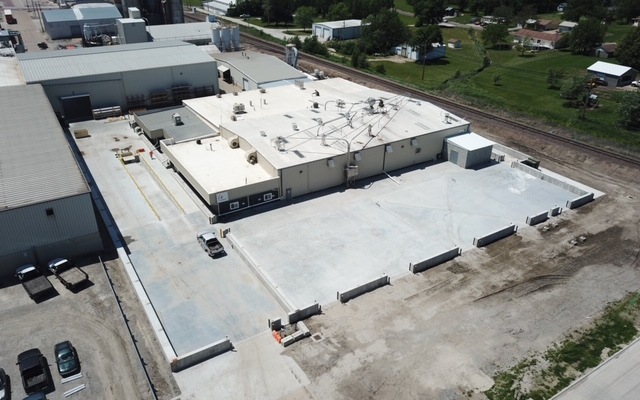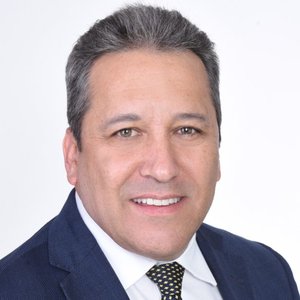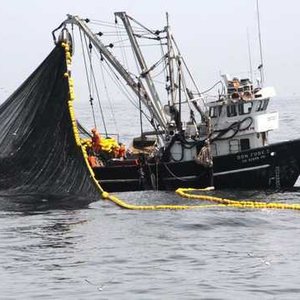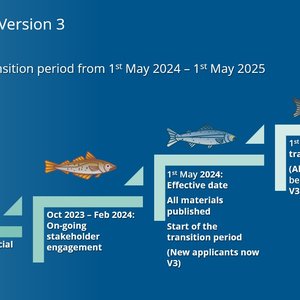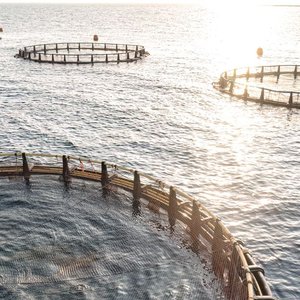The expansion of the Wenger Technical Center in Sabetha, Kansas, U.S., is keeping pace and hitting construction milestones, even in the face of obstacles created by the COVID-19 pandemic.
“The pandemic has not disrupted plans or impeded progress with the upgrade,” said Brend King, vice president and technical center director. “We have excellent momentum—construction of the new building is hitting every milestone while the technical center is still fully operational inside.”
Work already was well underway on the $13 million renovation when COVID-19 abruptly forced businesses to shift operation protocols. The new building is being constructed around the old—the modernized, tension fabric structure will completely enclose the existing facade. That original steel structure then will be taken down, revealing capacity that is 40% larger and able to fit full-scale, commercial versions of nearly every piece of equipment Wenger manufactures.
The new structure is scheduled for completion in July and the demolition of the old building will begin in August. While the pandemic did slow progress slightly at the beginning, King said they’ve amended schedules when needed and have been recouping lost time as work moves along.
Meanwhile, testing and R&D projects continue inside the building, though protocols have been modified due to COVID-19. Wenger clients depend on the technical center as a low-risk testing environment for new products and processes. “Clients need us to continue functioning so they can meet their objectives, and we are committed to remain open and operational during this unpredictable time,” King said. “Our ingenuity drives us, and with persistence and flexibility we’ve found ways to work around the COVID-19 curveballs and stay open for business.”
For the time being, Wenger is unable to allow customers physically in the facility, but the team shares photos and video and provides detailed data sheets to show customers how the extruders and formulations are set up. They also send samples of the end product.
“Thankfully, this is temporary,” King said. “Customers have been very understanding and cooperative with these less-than-ideal, but necessary, changes to protocol. We’re tremendously proud and grateful to have earned trust in the industry so that clients are comfortable letting us conduct runs on their behalf,” King saids. And in those instances where clients must be present, Wenger has shifted projects to a timeframe when restrictions are loosened.
Justin Moore, extrusion coordinator for companion animals and aquafeed, and Topher Dohl, extrusion coordinator for human food and industrial, have focused on scheduling and communication with customers to keep them apprised and meet everyone’s needs.
King said the shuffling of schedules has opened up time to focus on Wenger R&D projects, allowing the team to gather data to validate assumptions and theories. “We’ve made some incremental steps on R&D processes we’ve been working on internally—and we look forward to sharing these exciting innovations.” It also has allowed Wenger to finish internal projects early to leave more time for client projects pushed to a later date.
The general contractor PMI Nebraska LLC, along with CL Construction of Lincoln, worked through difficult weather and muddy conditions this winter and spring to keep the project pushing forward. Wenger also is working with Pinnacle Electric, PCI Mechanical, Schenck Process, Scott Equipment and IPS on various aspects of the project.
As for COVID-19 precautions, Wenger is following public health expert advice and implementing measures related to social distancing, hand washing, and sanitizing high-touch areas. They take temperatures in the morning and limit contact among employees. “Safety is always a top priority at the technical center, pandemic or not; and because many of our processes deal with food products, our standard safety practices match up well with public health guidelines for COVID-19,” King said. “It was easy to build social distancing measures onto the sound health and safety practices we already had in place.”


